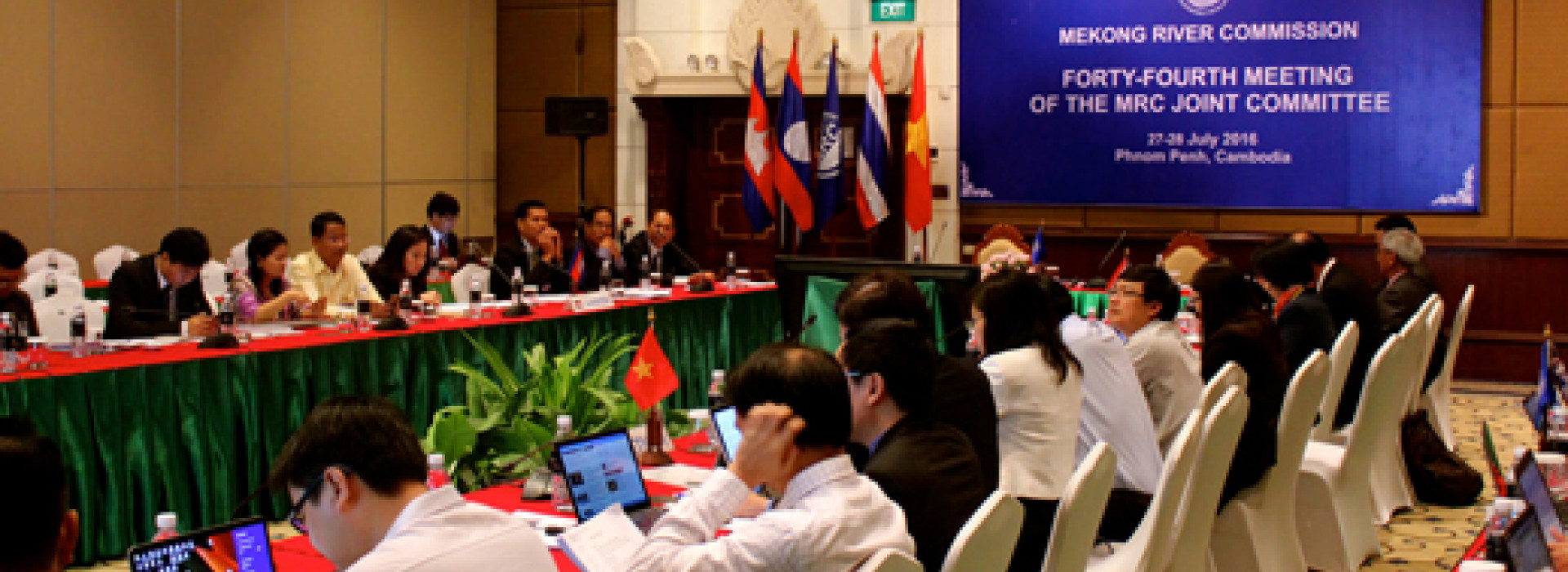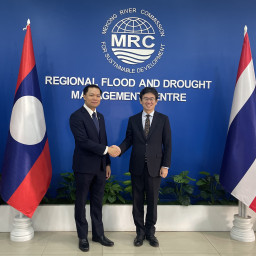New funding and prioritised work areas boost MRC’s role in regional development
Phnom Penh, Cambodia, 28 July 2016 – The effects of climate change and basin development, the prolonged drought caused by El Niño, and increased cooperation with upstream countries were among the main topics discussed at the 44th Meeting of the Mekong River Commission’s Joint Committee, held in Phnom Penh, Cambodia from 27-28 July.
The two-day meeting gathered senior officials of the four Member Countries – Cambodia, Lao PDR, Thailand and Viet Nam – to discuss progress related to the decentralisation of the MRC’s Core River Basin Management Functions, implementation of the Annual Work Plan 2016, cooperation with Dialogue Partners and Development Partners and regional initiatives. The JC is charged with implementing decisions and policies made by the MRC Council, the organisation’s highest decision-making body.
As the MRC enters a new strategic cycle under a new organisational structure, climate change adaptation, sustainable hydropower, water quality monitoring, flood and drought mitigation, and the implementation of the organisation’s procedures have become some of the prioritised areas of work.
The Commission has continued its comprehensive study on sustainable management and development of the Mekong River including impacts by mainstream hydropower projects. The “Council Study”, scheduled for completion in 2017, will fill knowledge gaps and minimise the uncertainty in the predictions of impacts caused by different uses of water and related resources in the Mekong River Basin.
Climate change adaptation is at the top of the MRC’s agenda and the organisation is completing an assessment of the effects of climate change on hydrology, floods, drought, ecosystems and biodiversity, hydropower development, and socio-economic conditions in the Lower Mekong Basin. Meanwhile, experts from the Commission have come up with climate change scenarios to assess future impacts, vulnerabilities and risks from climate change.
In response to the prolonged drought 2015-2016 caused by El Niño phenomenon, the MRC has closely monitored the situation and collected information on its effects on agriculture and the environment. In March, China released supplementary water from its Yunnan’s Jinghong Reservoir as an emergency measure to alleviate the effects of the drought downstream. The MRC and China have been studying the effects of this measure, and the results will be published soon in a joint report. Representatives from China will discuss this and other topics related to cooperation at the Annual Dialogue Partners meeting on 29 July, which will include Myanmar, the other upstream partner.
To support the MRC’s work, development partners (donors) from Germany, Switzerland, Belgium, and Luxembourg have signed new agreements for more than US$10 million dollars to fund various activities of the new strategic plan in areas such as wetlands management, waterborne transportation, and organisational management. The Netherlands has expressed its intention to return to the organisation’s group of donors, and The Kingdom of Morocco is interested in becoming the first African development partner of the MRC.
Water diplomacy is one of the central aspects of the MRC’s mission, and the results of the prior consultations for the Xayaburi and Don Sahong hydropower projects have led the organisation to analyse the strengths and weaknesses of the Procedures for Notification, Prior Consultation and Agreement (PNPCA) and to derive useful lessons for future application. The results of this ongoing analysis will help address ambiguities in interpretation, and improve the implementation and public perception of the procedure. Meanwhile, the MRC member states are considering a joint monitoring initiative of the Xayaburi and Don Sahong hydropower projects to generate reliable scientific data and information on specific transboundary issues related to fisheries, hydrology and hydraulics, sediment and water quality.
Note to editors:
The MRC is the intergovernmental body responsible for cooperation on the sustainable management of the Mekong Basin whose members include Cambodia, Lao PDR, Thailand and Viet Nam. It serves as a regional platform for water diplomacy as well as a knowledge hub of water resources management for the sustainable development of the region. It is not a supra-national or regulatory body. The commission looks across all sectors including sustaining fisheries, identifying opportunities for agriculture, maintaining the freedom of navigation, flood management and preserving important ecosystems. Superimposed on these are the future effects of more extreme floods, prolonged drought and sea level rise associated with climate change.
-END-





